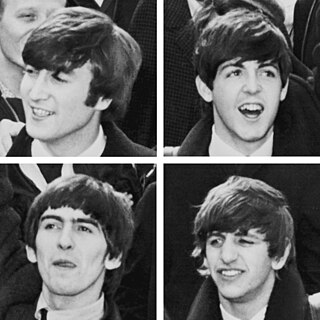
The Beatles were an English rock band, formed in Liverpool in 1960, that comprised John Lennon, Paul McCartney, George Harrison and Ringo Starr. They are regarded as the most influential band of all time and were integral to the development of 1960s counterculture and popular music's recognition as an art form. Rooted in skiffle, beat, and 1950s rock 'n' roll, their sound incorporated elements of classical music and traditional pop in innovative ways; the band also explored music styles ranging from folk and Indian music to psychedelia and hard rock. As pioneers in recording, songwriting and artistic presentation, the Beatles revolutionised many aspects of the music industry and were often publicised as leaders of the era's youth and sociocultural movements.

Please Please Me is the debut studio album by the English rock band the Beatles. Produced by George Martin, it was released in the UK on EMI's Parlophone label on 22 March 1963. The album is 14 songs in length, and contains a mixture of cover songs and original material written by the partnership of the band's John Lennon and Paul McCartney.
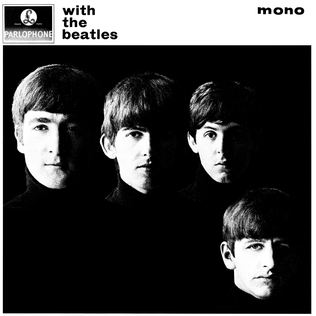
With the Beatles is the second studio album by the English rock band the Beatles. It was released in the United Kingdom on 22 November 1963 on Parlophone, eight months after the band's debut Please Please Me. Produced by George Martin, the album features eight original compositions and six covers. The sessions also yielded the non-album single, "I Want to Hold Your Hand" backed by "This Boy". The cover photograph was taken by the fashion photographer Robert Freeman and has since been mimicked by several music groups. A different cover was used for the Australian release of the album, which the Beatles were displeased with.

John Lennon/Plastic Ono Band is the debut solo album by English musician John Lennon. Backed by the Plastic Ono Band, it was released by Apple Records on 11 December 1970 in tandem with the similarly titled album by his wife, Yoko Ono. At the time of its issue, John Lennon/Plastic Ono Band received mixed reviews overall, but later came to be widely regarded as Lennon's best solo album.

Abbey Road is the eleventh studio album by the English rock band the Beatles. It is the last album the group recorded, although Let It Be was the last album completed before the band's break-up in April 1970. It was mostly recorded in April, July and August 1969, and was released on 26 September 1969 in the United Kingdom, and 1 October 1969 in the United States, reaching number one in both countries. A double A-side single from the album, "Something" / "Come Together" was released in October, which also topped the charts in the US.
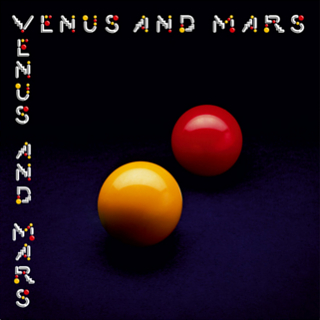
Venus and Mars is the fourth studio album by the British–American rock band Wings, and the sixth album by Paul McCartney after the break-up of the Beatles in 1970. Released in May 1975 as the follow-up to Band on the Run, Venus and Mars continued Wings' run of commercial success and provided a springboard for a year-long worldwide tour. The album was McCartney's first post-Beatles album to be released worldwide by Capitol Records rather than Apple.
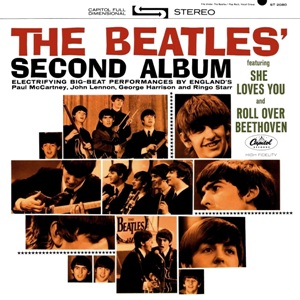
The Beatles' Second Album is the second Capitol Records album by the English rock band the Beatles, and their third album released in the United States including Introducing... The Beatles, which was issued three months earlier by Vee-Jay Records. Following its release in April 1964, The Beatles' Second Album replaced Meet the Beatles! at number 1 on the Billboard Top LPs chart in the US. The album was compiled mostly from leftover tracks from the UK album With the Beatles and Long Tall Sally EP, which are predominantly rock and roll and R&B covers, and rounded out with several Lennon-McCartney-penned non-album b-sides and the hit single "She Loves You". Among critics, it is considered the band's purest rock and roll album and praised for its soulful takes on both contemporary black music hits and original material.

Wild Life is the debut studio album by the British-American rock band Wings and the third studio album by Paul McCartney after the breakup of the Beatles. The album was recorded in eight days, from 25 July to 2 August 1971, at EMI Studios by McCartney, his wife Linda, session drummer Denny Seiwell, whom they had worked with on the McCartneys' previous album Ram, and guitarist Denny Laine, formerly of the English rock band the Moody Blues. It was released by Apple Records on 7 December in the UK and US, to lukewarm critical and commercial reaction.

The House of Love are an English alternative rock band, formed in London in 1986 by singer-songwriter-guitarist Guy Chadwick and co-founder and lead guitarist Terry Bickers. They rose to prominence in 1987 with their first single "Shine On", released on the independent label Creation. The following year, the band released their critically acclaimed eponymous debut album and built their reputation over the next few years through subsequent releases, constant touring and the support of English press. They signed with Fontana Records in 1989 and met commercial success in 1990 with their second self-titled album, which peaked at number 8 in the UK albums chart. Their third album, Babe Rainbow, was favourably met by the critics in 1992 and also reached the top 40 in the UK.
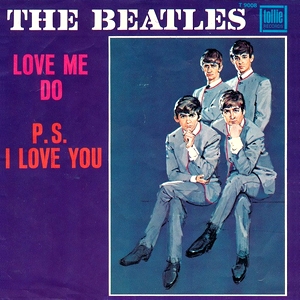
"P.S. I Love You" is a song recorded by English rock band the Beatles in 1962. It was composed principally by Paul McCartney, and produced by Ron Richards. The song was released in the UK on 5 October 1962 as the B-side of their debut single "Love Me Do" and is also included on their debut album Please Please Me (1963). It was later included on the American release Introducing... The Beatles (1964), its reissue The Early Beatles (1965), and the Beatles compilation album Love Songs (1977).

Naughty by Nature is the second album from Naughty by Nature, released on September 3, 1991, through Tommy Boy Records. The album was recorded through November 1990 to August 1991. It was a critical and commercial success, having been certified platinum on February 6, 1992, thanks in large part to the hit single, "O.P.P.," which reached #6 on the Billboard Hot 100 in 1991.
Zoo Records was a British independent record label formed by Bill Drummond and David Balfe in 1978. Zoo was launched to release the work of the perennially struggling Liverpool band Big in Japan. The label also released two singles by Lori and the Chameleons, a Balfe and Drummond band which they formed after Big in Japan folded. Zoo Records went on to release early work from The Teardrop Explodes and Echo & the Bunnymen. The label also released the first single, "Iggy Pop's Jacket", by the Liverpool band Those Naughty Lumps.

"Boys" is a song written by Luther Dixon and Wes Farrell, originally recorded by the Shirelles at Bell Sound Studios in New York City and released as the B-side of their "Will You Love Me Tomorrow" single in November 1960. It was recorded more than two years later by the Beatles and included on their debut album in the United Kingdom, Please Please Me (1963).

The House of Love is the eponymous debut album by the British alternative rock band the House of Love. Released in June 1988 by Creation Records, the album was a critical success. It appeared in many 1988 critics' lists in NME, Melody Maker and Sounds.
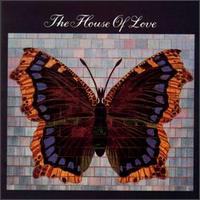
The House of Love is the second album by British alternative rock band the House of Love, released on Fontana Records in 1990. It should not be confused with the band's debut album, which is also called The House of Love. It is generally referred to either as Fontana or The Butterfly Album.
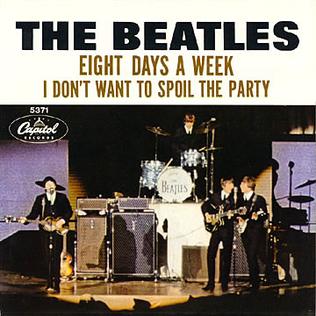
"Eight Days a Week" is a song by the English rock band the Beatles. It was written by Paul McCartney and John Lennon based on McCartney's original idea. The song was released in the United Kingdom in December 1964 on the album Beatles for Sale. In the United States, it was first issued as a single in February 1965 before appearing on the North American release Beatles VI. The song was the band's seventh number 1 single on the Billboard Hot 100, a run of US chart success achieved in just over a year. The single was also number 1 in Canada, Belgium and the Netherlands.
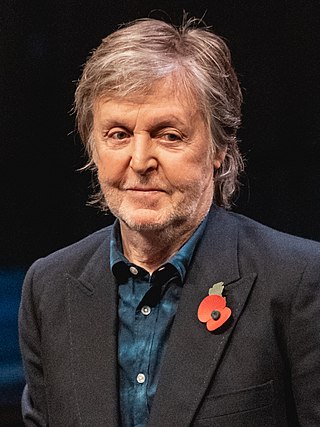
Sir James Paul McCartney is an English singer, songwriter and musician who gained worldwide fame with the Beatles, for whom he played bass guitar and shared primary songwriting and lead vocal duties with John Lennon. One of the most successful composers and performers of all time, McCartney is known for his melodic approach to bass-playing, versatile and wide tenor vocal range, and musical eclecticism, exploring genres ranging from pre–rock and roll pop to classical, ballads, and electronica. His songwriting partnership with Lennon remains the most successful in history.

"Got to Get You into My Life" is a song by the English rock band the Beatles, first released in 1966 on their album Revolver. It was written by Paul McCartney and credited to Lennon–McCartney. The song is a homage to the Motown Sound, with colourful brass instrumentation and lyrics that suggest a psychedelic experience. "It's actually an ode to pot," McCartney explained. A cover version by Cliff Bennett and the Rebel Rousers, produced by McCartney, peaked at number six in 1966 in the UK. The song was issued in the United States as a single from the Rock 'n' Roll Music compilation album in 1976, six years after the Beatles disbanded. Another cover version by Earth, Wind & Fire from the Sgt. Pepper's Lonely Hearts Club Band film soundtrack peaked at number nine in the US in 1978.
Rarities is the name of two separate and unrelated compilation albums by the English rock band the Beatles. The first was released in the United Kingdom in December 1978, while the second album was issued in the United States in March 1980.
Return to Pepperland is the name given to an unfinished recording project by English musician Paul McCartney with American record producer Phil Ramone. The songs recorded during these sessions have been the basis of bootleg albums usually titled Return to Pepperland.

















